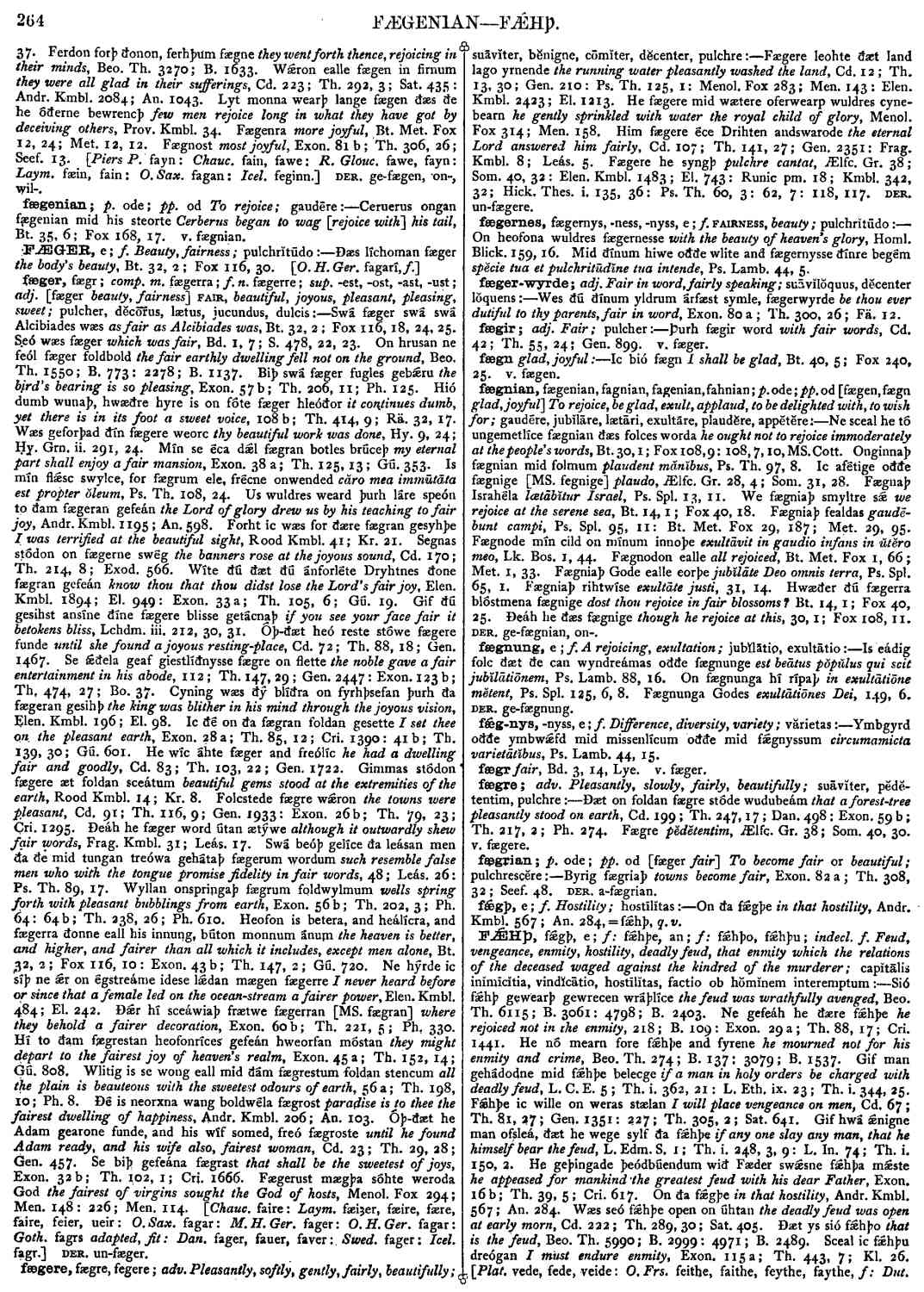fæger
- noun [ feminine ]
- adjective
-
Swá fæger swá swá Alcibiades wæs
as fair as Alcibiades was,
- Bt. 32, 2;
- Fox 116, 18, 24, 25.
-
Seó wæs fæger
which was fair,
- Bd. 1, 7;
- S. 478, 22, 23.
-
On hrusan ne feól fæger foldbold
the fair earthly dwelling fell not on the ground,
- Beo. Th. 1550 ;
- B. 773: 2278 ;
- B. 1137 .
-
Biþ swá fæger fugles gebǽru
the bird's bearing is so pleasing,
- Exon. 57 b ;
- Th. 206, 11;
- Ph. 125 .
-
Hió dumb wunaþ, hwæðre hyre is on fóte fæger hleóðor
it continues dumb, yet there is in its foot a sweet voice,
108 b;- Th. 414, 9;
- Rä. 32, 17.
-
Wæs geforþad ðín fægere weorc
thy beautiful work was done,
- Hy. 9, 24;
- Hy. Grn ii. 291, 24.
-
Mín se éca dǽl fægran botles brúceþ
my eternal part shall enjoy a fair mansion,
- Exon. 38 a ;
- Th. 125, 13;
- Gú. 353 .
-
Is mín flǽsc swylce, for fægrum ele, frécne onwended
căro mea immūtāta est propter ŏleum,
- Ps. Th. 108, 24.
-
Us wuldres weard þurh láre speón to ðam fægeran gefeán
the Lord of glory drew us by his teaching to fair joy,
- Andr. Kmbl. 1195 ;
- An. 598 .
-
Forht ic wæs for ðære fægran gesyhþe
I was terrified at the beautiful sight,
Rood- Kmbl. 41 ;
- Kr. 21 .
-
Segnas stódon on fægere swég
the banners rose at the joyous sound,
- Cd. 170 ;
- Th. 214, 8;
- Exod. 566 .
-
Wíte ðú ðæt ðú ánforléte Dryhtnes ðone fægran gefeán
know thou that thou didst lose the Lord's fair joy,
- Elen. Kmbl. 1894 ;
- El. 949: Exon. 33 a ;
- Th. 105, 6;
- Gú. 19 .
-
Gif ðú gesihst ansíne ðíne fægere blisse getácnaþ
if you see your face fair it betokens bliss,
- Lchdm. iii. 212, 30, 31.
-
Óþ-ðæt heó reste stówe fægere funde
until she found a joyous resting-place,
- Cd. 72 ;
- Th. 88, 18 ;
- Gen. 1467 .
-
Se ǽðela geaf giestlíðnysse fægre on flette
the noble gave a fair entertainment in his abode,
- 112 ;
- Th. 147, 29;
- Gen. 2447: Exon. 123 b ;
- Th. 474, 27;
- Bo. 37 .
-
Cyning wæs ðý blíðra on fyrhþsefan þurh ða fægeran gesihþ
the king was blither in his mind through the joyous vision,
- Elen. Kmbl. 196 ;
- El. 98 .
-
Ic ðé on ða fægran foldan gesette
I set thee on the pleasant earth,
- Exon. 28 a ;
- Th. 85, 12;
- Cri. 1390: 41 b ;
- Th. 139, 30;
- Gú. 601 .
-
He wíc áhte fæger and freólíc
he had a dwelling fair and goodly,
- Cd. 83 ;
- Th. 103, 22;
- Gen. 1722 .
-
Ginsmas stódon fægere æt foldan sceátum
beautiful gems stood at the extremities of the earth,
Rood- Kmbl. 14 ;
- Kr. 8 .
-
Folcstede fægre wǽron
the towns were pleasant,
- Cd. 91 ;
- Th. 116, 9;
- Gen. 1933: Exon. 26 b ;
- Th. 79, 23;
- Cri. 1295 .
-
Ðeáh he fæger word útan ætýwe
although it outwardly shew fair words,
- Frag. Kmbl. 31 ;
- Leás. 17 .
-
Swá beóþ gelíce ða leásan men ða ðe mid tungan treówa gehátaþ fægerum wordum
such resemble false men who with the tongue promise fidelity in fair words,
- 48 ;
- Leás. 26: Ps. Th. 89, 17.
-
Wyllan onspringaþ fægrum foldwylmum
wells spring forth with pleasant bubblings from earth,
- Exon. 56 b ;
- Th. 202, 3;
- Ph. 64: 64 b ;
- Th. 238, 26;
- Ph. 610 .
-
Heofon is betera, and heálícra, andfægerra ðonne eall his innung, búton monnum ánum
the heaven is better, and higher, and fairer than all which it includes, except men alone,
- Bt. 32, 2;
- Fox 116, 10: Exon. 43 b ;
- Th. 147, 2;
- Gú. 720 .
-
Ne hýrde ic síþ ne ǽr on égstreáme idese lǽdan mægen fægerre
I never heard before or since that a female led on the ocean-stream a fairer power,
- Elen. Kmbl. 484 ;
- El. 242 .
-
Ðǽr hí sceáwiaþ frætwe fægerran [MS. fægran]
where they behold a fairer decoration,
- Exon. 60 b ;
- Th. 221, 5;
- Ph. 330 .
-
Hí to ðam fægrestan heofonríces gefeán hweorfan móstan
they might depart to the fairest joy of heaven's realm,
- Exon. 45 a ;
- Th. 152, 14;
- Gú. 808 .
-
Wlitig is se wong eall mid ðám fægrestum foldan stencum
all the plain is beauteous with the sweetest odours of earth,
56 a;- Th. 198, 10;
- Ph. 8 .
-
Ðé is neorxna wang boldwéla fægrost
paradise is to thee the fairest dwelling of happiness,
- Andr. Kmbl. 206 ;
- An. 103 .
-
Óþ-ðæt he Adam gearone funde, and his wíf somed, freó fægroste
until he found Adam ready, and his wife also, fairest woman,
- Cd. 23b ;
- Th. 29, 28;
- Gen. 457 .
-
Se biþ gefeán fægrast
that shall be the sweetest of joys,
- Exon. 32 b ;
- Th. 102, 1;
- Cri. 1666 .
-
Fægerust mægþa sóhte weroda God
the fairest of virgins sought the God of hosts,
- Menol. Fox 294 ;
- Men. 148: 226 ;
- Men. 114 .
Bosworth, Joseph. “fæger.” In An Anglo-Saxon Dictionary Online, edited by Thomas Northcote Toller, Christ Sean, and Ondřej Tichy. Prague: Faculty of Arts, Charles University, 2014. https://bosworthtoller.com/9913.
Checked: 1